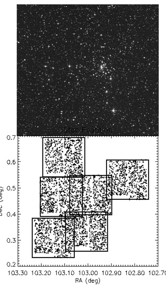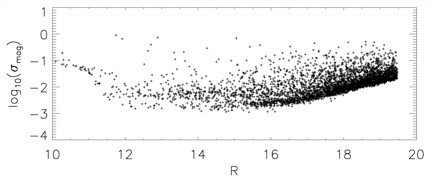Summary details for NGC 2301 Exoplanet Archive-ETSS Data Sets
Telescope
University of Hawaii 88 inch (2.2m).
Instruments
OPTIC: orthogonal transfer CCD (Tonry et al. 1997; Howell et al. 2003)
Observed Region
The NGC2301 data are separated into six separate regions on the sky called fields which are labeled (see Figure 1 below).
- NGC2301_Center
- NGC2301_East
- NGC2301_North
- NGC2301_South
- NGC2301_SouthEast
- NGC2301_West
The fieldnames are somewhat arbitrary and only serve to distinguish stars observed in different parts of the cluster. The stars within each of these fields are identified and are enumerated. Equatorial coordinates (right ascension and declination) are assigned to each star. A unique identification is assigned to each star via the following nomenclature: NGC2301_Fieldname_Num.

Figure 1: Image of NGC 2301 from the POSS2/red digitized sky survey (top) and the location of our six imaged fields (bottom). The two panels are the same size and have the same field center. North is up and east is to the left. Figure is from Howell et al. 2005.
Observed Filters
Observations of NGC2301 were made in both the B and R filters. The B magnitudes are single epoch (i.e., a single B magnitude is provided for each star). The time-series photometry was performed in the R filter. There is a single (average) R magnitude for each star, and an R-filter light curve for each star. Stars appearing in the overlap regions are cross-referenced, but kept as individual entries and light curves.
Photometric Technique
Ensemble differential photometry was performed on R-band images. Typical R-band precision for differential photometry is quoted as 0.002-0.003 mmag across R = 11.5 - 16.5 mag (see Figure 2). The errors on the average (single-epoch) B-band and R-band absolute magnitudes are estimated to be 0.1 - 0.2 mag.

Figure 2: Photometric uncertainty for the stars in our sample. Here δ is the standard deviation of the entire light curve for each point source. Note the relatively flat error response from R = 11.7 to 16.5. Figure is from Tonry et al. 2005.
Data Ranges
The data parameters fall into the following approximate ranges:
| Field | Min | Max |
|---|---|---|
| RA (2000) | 6 51.000 | 6 52.916 |
| Dec (2000) | +0 14.005 | +0 41.446 |
| HJD of the observation |
2453047.76 | 2453058.94 |
| B magnitude | 10.01 | 22.449 |
| R magnitude | 9.844 | 19.478 |
| Total number of stars | - | 3961 |
| Number of epochs | - | ~150 |
Download Data Sets
| NGC 2301 summary file | IPAC ASCII format table |
| NGC 2301 light curves | Download scripts |
Primary References
- "A Search for Variable Stars and Planetary Occultations in NGC 2301 I: Techniques", Tonry, J. L., Howell, S. B., Everett, M. E., Rodney, S. A., Willman, M., and VanOutryve, C. 2005, PASP, 117, 829
- "A Search for Variable Stars and Planetary Occultations in NGC 2301 II: Variability", Howell, S. B., VanOutryve, C., Tonry, J. L., Everett, M. E., and Schneider, R. 2005, PASP, 117, 1187




